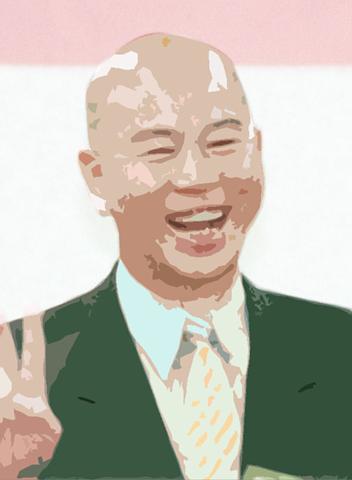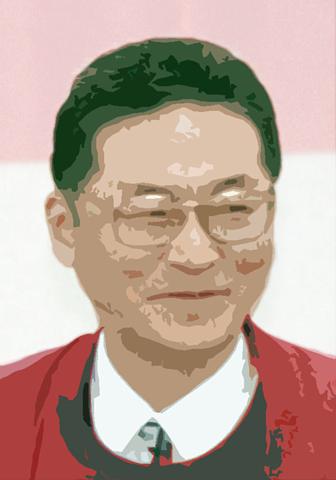The two biggest losers in yesterday's election made appeals and offered excuses as the dust settled and Chen Shui-bian
Independent candidate Hsu Hsin-liang
Hsu held a post-election press conference to congratulate Chen and to call on the public to reunite after a divisive election campaign. The former chairman of the DPP, Hsu left the party to make his ill-fated bid for the presidency.

FILE PHOTO
Hsu said he sincerely accepted the voters' choice and appealed to Chen to ease cross-strait tensions and promote the public's confidence in Taiwan's economy.
Hsu did not say much about his future nor did he directly answer speculation that he might try to found a new party.
"I never felt frustrated and will keep going," he said.

FILE PHOTO
New Party vice-presidential candidate Elmer Feng (馮滬祥) also held a post-election press conference, in the absence of the party's presidential candidate Li Ao (李敖), to blame his party's loss on a rumor, saying President Lee Teng-hui (李登輝) wanted to "Dump Lien to save Chen" (棄連保陳).
The New Party made an abysmal showing, eking out just 0.1 percent of the total, or 16,782 votes.
The convener of the New Party caucus, Hao Lung-bin (郝龍斌), said Chen's victory was mainly based on anti-China sentiment,along with Academic Sinica president Lee Yuan-tseh's (李遠哲) powerful support for Chen and the divisions within the KMT.
Hao said threatening statements from Chinese Premier Zhu Rongji (朱鎔基) triggered Taiwanese voters' negative emotions and pushed them towards Chen. However, Hao emphasized that "the [Taiwanese] anti-China complex doesn't mean that Taiwanese espouse independence."
Responding to general doubt about the New Party's future, Hao said the poor showing was not equal to the party's demise.
"Li and Feng's endeavors in the election campaign have reached the goal of promoting the New Party's propaganda," Hao said.
Li didn't even show up at the New Party's post-election press conference, saying he was not interested in the result and was happy that the election had finally come to an end. Although Li refused to join the party as a member, he stood as its candidate.

DAREDEVIL: Honnold said it had always been a dream of his to climb Taipei 101, while a Netflix producer said the skyscraper was ‘a real icon of this country’ US climber Alex Honnold yesterday took on Taiwan’s tallest building, becoming the first person to scale Taipei 101 without a rope, harness or safety net. Hundreds of spectators gathered at the base of the 101-story skyscraper to watch Honnold, 40, embark on his daredevil feat, which was also broadcast live on Netflix. Dressed in a red T-shirt and yellow custom-made climbing shoes, Honnold swiftly moved up the southeast face of the glass and steel building. At one point, he stepped onto a platform midway up to wave down at fans and onlookers who were taking photos. People watching from inside

A Vietnamese migrant worker yesterday won NT$12 million (US$379,627) on a Lunar New Year scratch card in Kaohsiung as part of Taiwan Lottery Co’s (台灣彩券) “NT$12 Million Grand Fortune” (1200萬大吉利) game. The man was the first top-prize winner of the new game launched on Jan. 6 to mark the Lunar New Year. Three Vietnamese migrant workers visited a Taiwan Lottery shop on Xinyue Street in Kaohsiung’s Gangshan District (崗山), a store representative said. The player bought multiple tickets and, after winning nothing, held the final lottery ticket in one hand and rubbed the store’s statue of the Maitreya Buddha’s belly with the other,

‘NATO-PLUS’: ‘Our strategic partners in the Indo-Pacific are facing increasing aggression by the Chinese Communist Party,’ US Representative Rob Wittman said The US House of Representatives on Monday released its version of the Consolidated Appropriations Act, which includes US$1.15 billion to support security cooperation with Taiwan. The omnibus act, covering US$1.2 trillion of spending, allocates US$1 billion for the Taiwan Security Cooperation Initiative, as well as US$150 million for the replacement of defense articles and reimbursement of defense services provided to Taiwan. The fund allocations were based on the US National Defense Authorization Act for fiscal 2026 that was passed by the US Congress last month and authorized up to US$1 billion to the US Defense Security Cooperation Agency in support of the

‘COMMITTED TO DETERRENCE’: Washington would stand by its allies, but it can only help as much as countries help themselves, Raymond Greene said The US is committed to deterrence in the first island chain, but it should not bear the burden alone, as “freedom is not free,” American Institute in Taiwan Director Raymond Greene said in a speech at the Institute for National Defense and Security Research’s “Strengthening Resilience: Defense as the Engine of Development” seminar in Taipei yesterday. In the speech, titled “Investing Together and a Secure and Prosperous Future,” Greene highlighted the contributions of US President Donald Trump’s administration to Taiwan’s defense efforts, including the establishment of supply chains for drones and autonomous systems, offers of security assistance and the expansion of